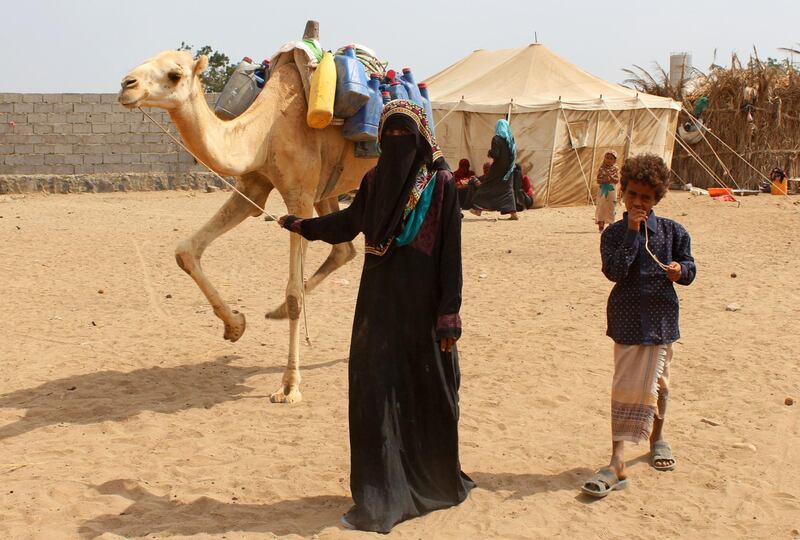Tens of thousands of Yemenis are fleeing their homes ahead of intense fighting near the port city of Hodeidah, Amnesty International said on Thursday.
The worst humanitarian crisis in Yemen's three-year-old conflict may lie ahead if fighting reaches urban areas, the watchdog warned.
“The human impact of this fresh military offensive on Yemen’s western coastal areas is clear in the distressing stories shared by civilians displaced by the conflict,” said Rawya Rageh, senior crisis response adviser at Amnesty International.
Yemeni forces backed by an Arab coalition are advancing against Houthi rebels on a number of fronts near the city. The coalition supports the internationally-recognised government of Yemen's President Abdrabu Mansur Hadi.
Amnesty International interviewed 34 Yemeni civilians who had fled Hodeidah towards Aden, where the Yemen government is exiled. Ms Rageh said the current exodus "is a glimpse of what potentially lies in store on a wider scale if the fighting encroaches on the densely populated port city of Hodeidah".
According to the United Nations, clashes along Yemen's western coast have displaced about 100,000 people in recent months, most of them from Hodeidah province. More than three million Yemeni civilians have been displaced in total so far during the conflict.
Hodeidah's docks handle the bulk of the country’s imports and aid supplies, but the Houthis have also used the port to smuggle Iranian-made weapons.
Meanwhile in Taez province, 133 Houthi fighters surrendered to Yemeni forces this week, according to Aseel Al Sakladi, the media officer with the Taez regional government. Many of the surrendering fighters belonged to elite forces from the Houthi stronghold of Sadaa.
"The Houthi fighters found themselves besieged as our forces took control over Al Bareh intersection which enabled us to cut many internal supply routes used by the Houthis to access food supplies and ammunitions to their outposts in Taez," Ms Al Sakladi said.
Elsewhere in the north of Yemen, Yemeni troops cut a supply route used by the Houthi militia in Sadaa.
And in Haja province, northeast Yemen, the army forces backed by Saudi forces captured parts of Al-Nar mountain in Haradh district.
The Yemeni government on Wednesday proposed a prisoner exchange with Houthi rebels for the holy month of Ramadan.
The Saudi information ministry in Riyadh, where Yemen's president has been based for the past three years since the rebels captured Sanaa, said the offer was made by Information Minister Moammer al Iryani and Human Rights Minister Mohammed Askar.
The ministers called for Red Crescent mediation for all prisoners to return to their homes for the holy month, including 14 Yemeni journalists held by the Houthis and an unspecified number of foreign detainees.
Tribal mediation has in the past led to the release of hundreds of prisoners by the warring parties. The number of those still detained is unknown.
Saudi Arabia launched an Arab military intervention in Yemen in March 2015, aimed at rolling back the Iran-backed Huthis and restoring the internationally recognised government to power.
The conflict has left nearly 10,000 people dead, tens of thousands wounded, and millions on the brink of famine in what the United Nations has called the world's worst humanitarian crisis.





